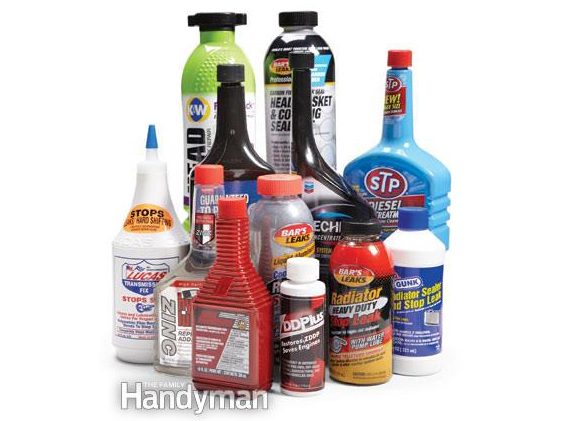
Fuel and Other Additives That Actually Work
Walk down the additives aisle at any auto parts store, and you’ll see a few hundred products all claiming to increase your gas mileage and convert your daily driver into a race car. Other “miracle in a bottle”-type products claim to seal your leaking engine, fix your transmission or restore an old, tired engine to “like new” condition. Do they work? Some do. But most are a waste of money. I’ll walk you through the maze of products and separate fact from, well, snake oil. Let’s start with the most effective additive-fuel injector cleaner.
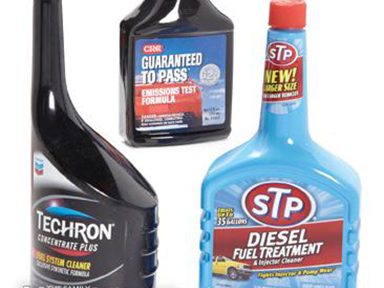
Fuel Additives and System Cleaners
All gasoline contains fuel injector cleaner. But Top Tier gasoline (marked on the pump at the gas station) contains a higher dose of it. So my first piece of advice is to spend a few cents more per litre and fill your tank with Top Tier gas. If you can’t find a station that carries Top Tier gas and you make a lot of short runs or drive in stop-and-go traffic, you may get better gas mileage and improve engine performance by adding a fuel system cleaner to your tank. Chevron Techron and CRC Guaranteed to Pass fuel system cleaners cost less than $13 and do a very good job. There’s no need to spend more than that on a fuel system cleaner. Just add a bottle to your tank once every 5,000 kilometres and your engine will thank you.
If you drive a diesel, Marvel Diesel Supplement or STP Diesel Fuel Treatment will clean the fuel system and lubricate the injectors. They’ll also reduce the risk of fuel waxing during cold weather.
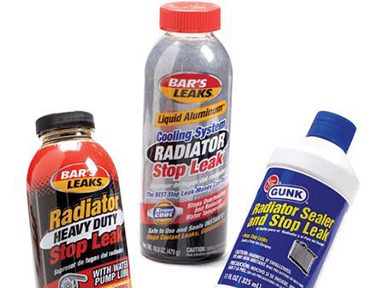
Engine Cooling System Additives
If you notice coolant puddles on your driveway, check for a cracked radiator or heater hose or a loose hose clamp. Repair that first. Next, check for a leaking core plug (also called a freeze plug). Core plugs are cheap and easy to replace if you can access the area easily.
But if it turns out your leak is coming from your radiator, heater core or an inaccessible core plug, try adding a cooling system sealer product like Bar’s Leaks No. PLT11 or Gunk C312 (about $5 at auto parts stores). If the product seals the leak, great. If not, you haven’t lost much money. Just remember to add another dose of sealer next time you change your coolant. If sealer doesn’t work, you’ll have to bite the bullet and replace the leaking component.
Add stop leak products directly to the radiator. If your vehicle doesn’t have a radiator cap, remove the upper hose, siphon out some coolant and pour it into the radiator with a funnel.
If your vehicle is overheating, forget about pouring in an additive (such as a wetting agent) to stop the overheating. None of them work. You’ll waste your money and risk permanent engine damage (a minimum $1,000 repair) simply by driving around waiting to see if the additive works. Just fork over the dough to fix the underlying cooling problem.
Another product to avoid is water pump lubricant. Fresh coolant does a fine job of lubricating the water pump.
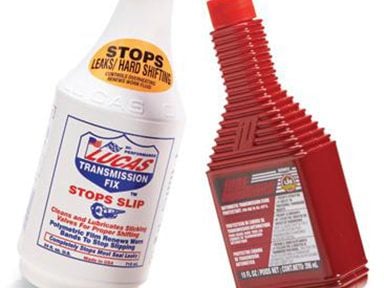
Engine Transmission Additives
If your transmission is slow to shift or reluctant to go into gear, and has plenty of fluid, it’s most likely ready to give up the ghost. If you’re a gambler, you can try a transmission “fix-in-bottle” additive. It may buy you a few more months of driving (at best). But don’t think you’ve fixed the problem. Your transmission is going to fail and probably sooner rather than later.
If your transmission shifts well but leaks fluid, you can add a transmission leak stop product. They work by swelling the seals to slow the leak. But they’re not a permanent fix. Eventually you’ll have to replace the leaky seals or gaskets.
To extend the life of an older but fully functional transmission, pour in a bottle of transmission fluid conditioner.
For older transmissions with no shifting problems, add a bottle of a fluid conditioner like LubeGard, Prolong or Lucas Transmission Fix (about $10). It bolsters the performance of older non-synthetic transmission fluids. You don’t need a conditioner if you’re driving a late-model vehicle with the newer long-life synthetic transmission fluids like Mercon V, Dexron VI or Chrysler ATF+4.
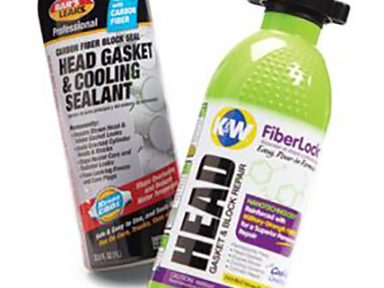
Head Gasket Sealers
If you constantly have to top off your coolant but can’t find any sign of an external leak, you probably have a leaking head gasket. Skip the inexpensive ($15 or less) head gasket sealers (they require at least two full days of water-flushing procedures). Instead, spend the extra bucks for Bar’s Leaks HG-1 Head Gasket & Cooling Sealant (about $45) or K&W FiberLock Head Gasket & Block Repair (No. 401224-6; about $35).
Pour the head gasket sealer directly into the radiator and run the engine for the specified period shown on the label.
There’s an important caveat to using any head gasket sealer. Your engine must be able to run for about 20 minutes without overheating or losing its coolant. If your engine overheats right away or loses coolant too fast, forget about a head gasket sealer-the cylinder head is probably warped. That’ll require machine shop service and a new gasket. If the head gasket sealer works, you don’t need to add new sealer when you change your coolant.
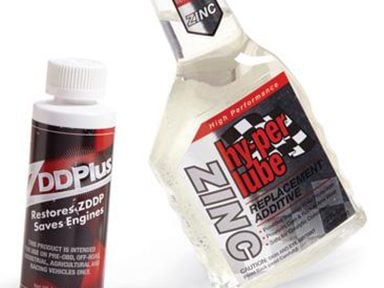
Engine Oil Additives
Skip any oil additives unless you have an old car (early ’80s or older). Those engines were built with high-friction flat tappet lifters, so they need a boost of anti-wear additive with ZDDP (zinc dialkyl dithio phosphate). Supplemental ZDDP additives cost less than $15 a bottle. Shop for brands like ZDDP Plus or Hy-Per Lube Zinc. Don’t use ZDDP additives with a post-’80s engine-extra ZDDP can damage your catalytic converter.
Hoping to restore your worn engine to “like new” condition with a restorative additive? Dream on-it’s just not going to happen. The same holds true for oil treatments that contain Teflon or other ingredients that claim to reduce friction and wear. Save your cash for something more beneficial, such as regular oil and filter changes.
Related features:
How to Avoid Getting Ripped Off by an Auto Mechanic
Is Premium Fuel Worth the Added Expense?
8 Expensive Mistakes That Devalue Your Car